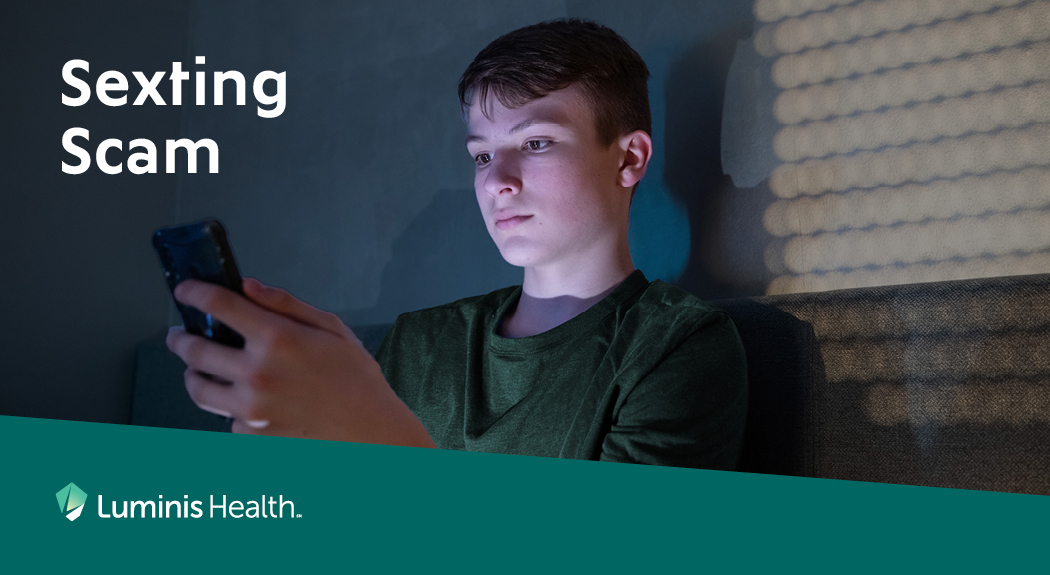If you have a teenager, no doubt the world is much different than your childhood. Social media apps have made it easy for teens to communicate with strangers—and sometimes, the people they interact with online are actually scammers.
Parents should prioritize monitoring their children’s online activities, especially their interactions with others. It’s crucial to engage in open and meaningful conversations about the potential risks of living in a social media obsessed world. You may be surprised to learn social media scams are far-reaching, impacting teens around the world. While anyone can fall victim to these sexting scams, teenage boys are often targeted by scammers using blackmail tactics.
What exactly are sexting scams?
Sometimes referred to as sextortion, sexting scams are meant to scare victims into handing over money. While the details can vary, scammers gain the trust of victims before tricking them into sharing compromising photos. The predator threatens to share the photos with the victims’ family and friends unless they pay money.
Strangers pose as interested girls and convince unsuspecting boys to send naked photos of themselves showing their face. After sending the photos, they are immediately blackmailed for money.
The frequency of this scam has prompted federal law enforcement to issue warnings, cautioning that scammers are targeting children as young as ten years old. If our kids aren’t equipped to recognize it as a scam — or don’t feel comfortable coming to their parents when it happens — it can be dangerous. Ranging from anxiety and depression to thoughts of suicide, these scams can have troubling and long-lasting effects on their mental health.
What are the signs my teen may be in trouble?
There are many signals to help you determine if your child may have been victimized. Parents should start asking questions if they discover their teen:
- Becomes unwilling to talk about their online interactions with you or anyone else
- Exhibits sudden changes in behavior, like moodiness or isolating themselves
- Expresses fear or discomfort about someone they met online
- Grades suddenly drop
- Loses interest in activities
- Receives messages from strangers asking for personal information
- Uses electronic devices to the point of ignoring things going on around them
- Withdraws money from bank accounts or purchases gift cards
How can I help if my teen falls victim to sexting scams?
If your child is in this kind of situation, you should take the following steps:
- Let the blackmailer know parents are now involved, you are not afraid, and the harassment needs to stop immediately.
- Keep proof of all conversations and make backups.
- Don’t send any money. Even if the harasser has potentially damaging photos of your child, there’s no guarantee that sending them money will end the blackmail.
- Report the scam to the social media platform.
- Contact the police. You can call the Federal Bureau of Investigation (FBI) at (800) CALL-FBI or report the harassment online at fbi.gov. You can also report the incident to the Internet Crimes Against Children Task Force at icactaskforce.org.
Talking to your teen openly and often is your best defense
The more you and your child talk about these situations, the less likely they are to become a victim. Before your child gets a cell phone, talk to them about the importance of keeping personal photos and personal information private, even if they are in a mature relationship. Sharing compromising photos is never a good idea. But if your teen shares nude photos, they should know that they can come to you, or another trusted adult, for help.
The Luminis Health Behavioral Health Clinic in Lanham is a safe space for teens. The urgent care offers services for those needing non-emergency, non-life-threatening behavioral health care. It’s open from 8 am to 5:30 pm, Monday-Friday, for adults and children 4 years of age and older.

Dr. Jesselina Curry is Luminis Health’s regional medical director for Ambulatory Behavioral Health Services




